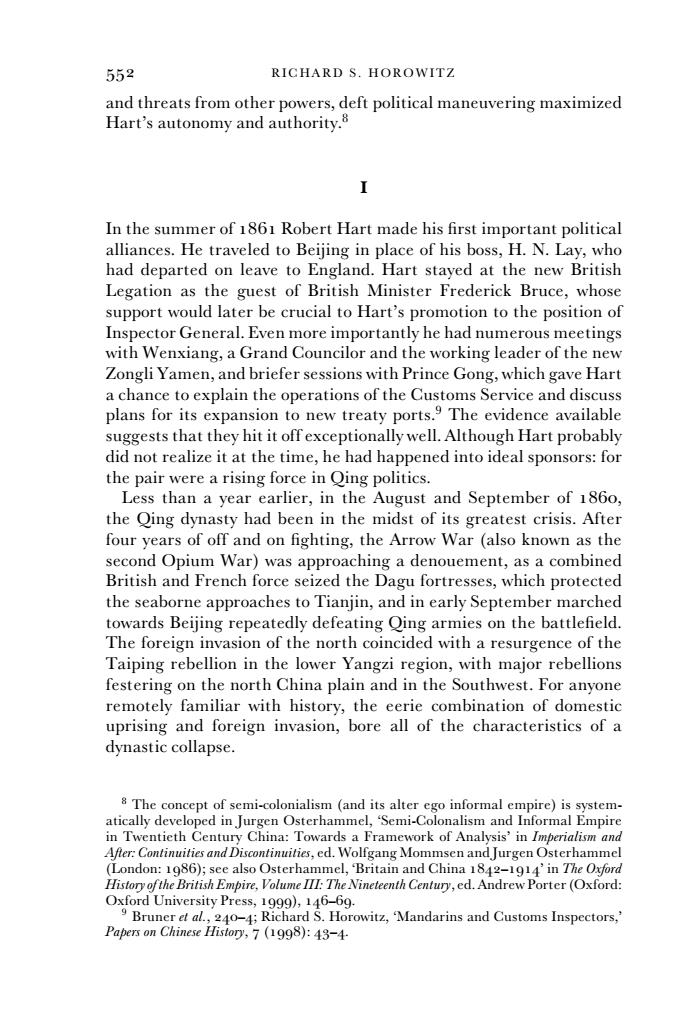正在加载图片...

552 RICHARD S.HOROWITZ and threats from other powers,deft political maneuvering maximized Hart's autonomy and authority.8 I In the summer of 1861 Robert Hart made his first important political alliances.He traveled to Beijing in place of his boss,H.N.Lay,who had departed on leave to England.Hart stayed at the new British Legation as the guest of British Minister Frederick Bruce,whose support would later be crucial to Hart's promotion to the position of Inspector General.Even more importantly he had numerous meetings with Wenxiang,a Grand Councilor and the working leader of the new Zongli Yamen,and briefer sessions with Prince Gong,which gave Hart a chance to explain the operations of the Customs Service and discuss plans for its expansion to new treaty ports.9 The evidence available suggests that they hit it off exceptionally well.Although Hart probably did not realize it at the time,he had happened into ideal sponsors:for the pair were a rising force in Qing politics. Less than a year earlier,in the August and September of 1860, the Qing dynasty had been in the midst of its greatest crisis.After four years of off and on fighting,the Arrow War(also known as the second Opium War)was approaching a denouement,as a combined British and French force seized the Dagu fortresses,which protected the seaborne approaches to Tianjin,and in early September marched towards Beijing repeatedly defeating Qing armies on the battlefield. The foreign invasion of the north coincided with a resurgence of the Taiping rebellion in the lower Yangzi region,with major rebellions festering on the north China plain and in the Southwest.For anyone remotely familiar with history,the eerie combination of domestic uprising and foreign invasion,bore all of the characteristics of a dynastic collapse. 8 The concept of semi-colonialism(and its alter ego informal empire)is system- atically developed in Jurgen Osterhammel,Semi-Colonalism and Informal Empire in Twentieth Century China:Towards a Framework of Analysis'in Imperialism and After:Continuities and Discontinuities,ed.Wolfgang Mommsen and Jurgen Osterhammel (London:1986);see also Osterhammel,Britain and China 1842-1914'in The Oxford History ofthe British Empire,Volume III:The Nineteenth Century,ed.Andrew Porter(Oxford: Oxford University Press,1999),146-69. 9 Bruner et al.,240-4;Richard S.Horowitz,Mandarins and Customs Inspectors,' Papers on Chinese History,7 (1998):43-4-552 RICHARD S. HOROWITZ and threats from other powers, deft political maneuvering maximized Hart’s autonomy and authority.8 I In the summer of 1861 Robert Hart made his first important political alliances. He traveled to Beijing in place of his boss, H. N. Lay, who had departed on leave to England. Hart stayed at the new British Legation as the guest of British Minister Frederick Bruce, whose support would later be crucial to Hart’s promotion to the position of Inspector General. Even more importantly he had numerous meetings with Wenxiang, a Grand Councilor and the working leader of the new Zongli Yamen, and briefer sessions with Prince Gong, which gave Hart a chance to explain the operations of the Customs Service and discuss plans for its expansion to new treaty ports.9 The evidence available suggests that they hit it off exceptionally well. Although Hart probably did not realize it at the time, he had happened into ideal sponsors: for the pair were a rising force in Qing politics. Less than a year earlier, in the August and September of 1860, the Qing dynasty had been in the midst of its greatest crisis. After four years of off and on fighting, the Arrow War (also known as the second Opium War) was approaching a denouement, as a combined British and French force seized the Dagu fortresses, which protected the seaborne approaches to Tianjin, and in early September marched towards Beijing repeatedly defeating Qing armies on the battlefield. The foreign invasion of the north coincided with a resurgence of the Taiping rebellion in the lower Yangzi region, with major rebellions festering on the north China plain and in the Southwest. For anyone remotely familiar with history, the eerie combination of domestic uprising and foreign invasion, bore all of the characteristics of a dynastic collapse. 8 The concept of semi-colonialism (and its alter ego informal empire) is systematically developed in Jurgen Osterhammel, ‘Semi-Colonalism and Informal Empire in Twentieth Century China: Towards a Framework of Analysis’ in Imperialism and After: Continuities and Discontinuities, ed. Wolfgang Mommsen and Jurgen Osterhammel (London: 1986); see also Osterhammel, ‘Britain and China 1842–1914’ in The Oxford History of the British Empire, Volume III: The Nineteenth Century, ed. Andrew Porter (Oxford: Oxford University Press, 1999), 146–69. 9 Bruner et al., 240–4; Richard S. Horowitz, ‘Mandarins and Customs Inspectors,’ Papers on Chinese History, 7 (1998): 43–4